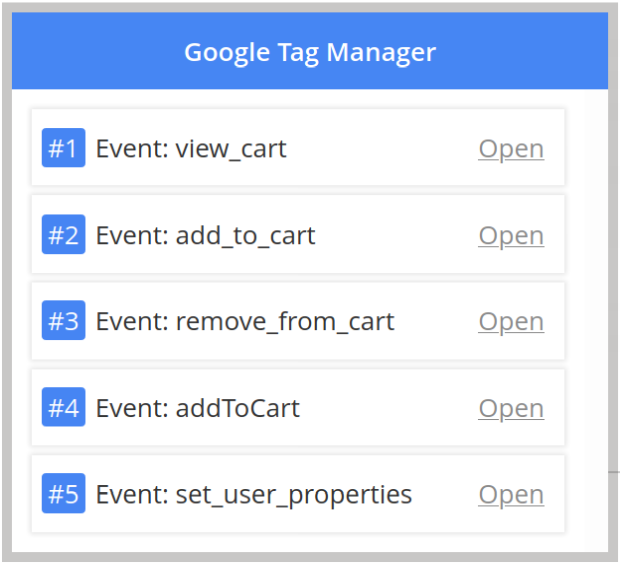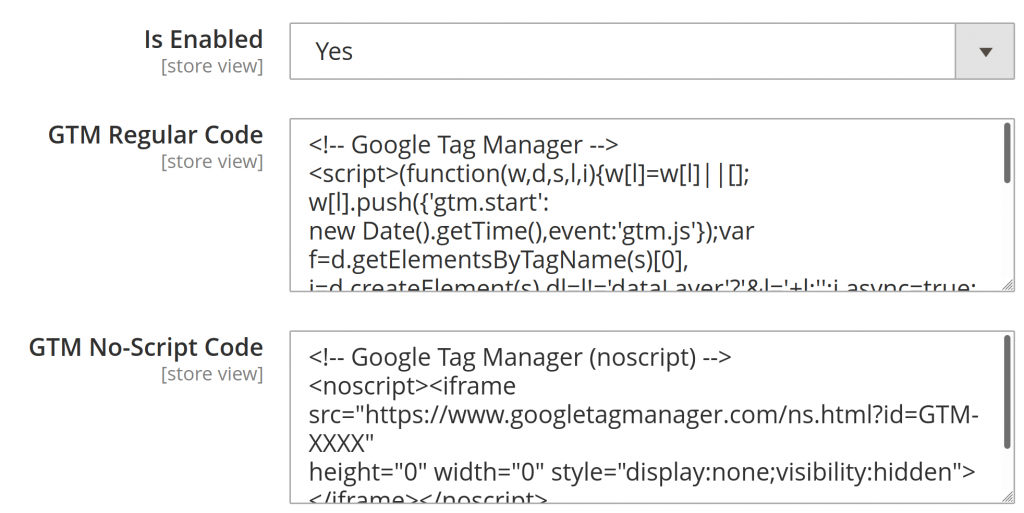
The Google Tag Manager extension for Magento 2
October 26, 2021Basically, business is a complex tandem of your skills, luck, and knowledge. One of the most valuable and essential resources here is information. Especially, when it comes to eCommerce that deals with people, their needs, and actual trends. You have to understand your customers and understand today’s market to be successful. That’s why analytics is so important in this niche. The more you know about customers — the more you can get. Thus, Google Analytics helps stores get to know more important details and facts. However, integrating such complex tracking features is expensive and complicated because you either have to be an expert who can do it without help or hire specialists that cost a lot of money. Anyway, you waste valuable resources, which is not good at all.
As a great alternative, we offer you a special plugin for Magento 2 that was developed specifically for tasks like these. Without special knowledge or extra help, you can activate business tracking and achieve greater success effortlessly. Let’s hurry up and learn more about this add-on together.
Features
Peek on what customers are doing in your shop

With the help of this plugin, you can activate eCommerce Tracking, which allows you to monitor almost anything that is done by customers while they are shopping. Such information can be extremely useful. Get to know what people purchase, what they usually pass by, and so on.
Use Google Analytics 4 at ease
The plugin grants you access to Google Analytics 3 and advanced Google Analytics 4 with all available features.
You are able to use all the standard eCommerce tags (Product/Item List Views/Impressions; Product/Item List Clicks; Checkouts; Purchases; Adds shipping info; and so on)
dimensions and metrics can be customized
Do not use only standard data, upload customized metrics to your reports to suit your business needs better. Take any information from your page and send it to GA (Google Analytics): SKU, fees or taxes, dynamic variables, special prices, and others. In addition to this, brands, customer groups, and product variants may be tracked.
Add brand new custom blocks to track
Custom product blocks can also be used to track statistics. Get the information about when customers are offered something special and when they accept these offerings. Use the add-on to track custom blocks with the following parameters:
- view_item_list
- view_item
- select_item
No need for special skills

The plugin simplifies the process of adding GTM service to a few simple clicks. Just copy-paste the required elements without editing codes. To realize how simple it is, just imagine what you have to do without this extension — you have to edit phtml templates and upload them somehow.
Debugging
The integrated debugging tool allows you to view what data is uploaded to GA on each event. This lets you gain more control over what is going on and prevent different issues.
FAQ

Q: What does Google Tag Manager (GTM) do?
A: GTM is a service provided by Google that allows website administrators to track events more easily. Such events can occur in an eCommerce store when a product is added to the basket, a catalog item is browsed, shipping information is entered, and so on.
This application gives business owners a simple user-friendly interface that they may use through their browser. Admins of eCommerce service stores may simply change tracking tags using the add-on without requiring extensive technical expertise or source code modification.
GTM is made up of the following components:
- Tag is a piece of code that is applied to a store page and is generally based on JavaScript.
- Triggers are used to start the execution of tags based on a certain occurrence.
- Variables store data from tags and triggers.
Those code snippets are used to keep track of things. GTM allows users to establish numerous tags for distinct occurrences they want to track. Data collected in a Magento 2 store may then be transmitted straight to analytic platforms like Google Analytics to generate improved reporting on occurrences.
Q: What are the benefits of using this module?
A: As a business owner, you can use this plugin to obtain detailed data on various occurrences in your store. This information may be utilized to improve your store’s marketing activities. The extension allows for the measurement of the audience and their activity, as well as the retargeting of marketing campaigns. It is an excellent instrument for increasing sales and revenue in any shop.
Default Google Tag Manager is integrated into Magento 2. It is, however, limited to the Magento 2 Adobe Commerce version for corporate clients. Built-in support for Google Tag Manager is not available for Magento 2 stores that utilize the Magento Open Source version.
Users of the Magento Open Source version can either change the source code of their frontend layout theme or simply install a Google Tag Manager extension to gain Google Tag Manager functionality. This tracking service is enabled through the Mirasvit Google Tag Manager plugin, which needs copying and pasting GTM code into the script and NoScript fields. Additionally, the Magento Google Tag Manager plugin provides complete support for the service’s tracking tags.
Q: How will it affect the overall productivity of my store?
A: Direct injection of tracking code snippets into your store’s source code allows you to collect statistics on its events. The execution of these inserted tags, on the other hand, might become a substantial cause of site slowness. Additionally, they may cause code congestion, making future Magento 2 store support much more difficult.
With the module, a business owner won’t have to worry about page loading slowdowns caused by event tracking. Server-side transaction tracking is a feature of GTM that allows tracking code snippets to be performed on the Google Cloud without slowing down the store’s loading time. Furthermore, server-side tracking ensures that every event is sent to an analytic service. Some events may be missed when tracking tags are inserted directly.
Q: Does this module provide users with advanced reports?
A: When using Google Tag Manager to gather data, the Google Analytics service may give considerably improved results. The letter enables fine-grained tracking of client activity in-store. A store owner may obtain information like:
- Customer shopping behavior by linking GTM to Google Analytics. This report shows each customer’s progress toward completing a purchase. This report may be used to identify points in a customer’s journey when they left without purchasing. GTM allows you to track product views, add items to your shopping cart, and complete checkouts, among other things.
- During the checkout process, the following behavior is seen. A shop owner may examine the consumer activities on the checkout page in detail with this report.
- Statistics about the products. A store owner may collect individual statistics on the performance of each product. When Google Analytics receives data from GTM, it may include pricing, quantity, revenue, user browsing, product additions, and removals.
- Sales. Google Analytics may provide a report on the store’s sales.
Q: Are custom dimensions really helpful?
A: A Magento 2 store may contain a lot of data, which Google Analytics does not support by default. Custom dimensions and metrics can be used to include non-standard data into Google Analytics. This reports service has custom measurements, which you may input from your shop. For example, with custom dimensions, data such as seen item vendors, hits of the user and their ID, and so on may be sent to an analytic service.
Q: What are the prerequisites for using the plugin?
A: To conduct a Magento Google Tag Manager Integration, you’ll need to create two Google Analytics and Google Tag Manager accounts. After you’ve registered an account, you’ll receive both regular and no-script code, which should be copied into the appropriate sections in the Google Tag Manager general setup section.
Conclusion
Talking about the Magento extension — google tag manager — it may be stated that purchasing a module that easily deals with problems connected with customers’ behavior is much more profitable and useful than trying to do everything on your own. Once you buy the plugin designed by Mirasvit, you get a perfect solution with decent 90-days free support, constant updates, and a money-back guarantee. Understand the needs of your clients better and analyze what’s going on to become a leader in this niche. Increase your total revenue without special skills or extra knowledge in coding and programming. Let one little tool do all the work for you. An eCommerce business may not be simple, but we offer you how to make it easier.

